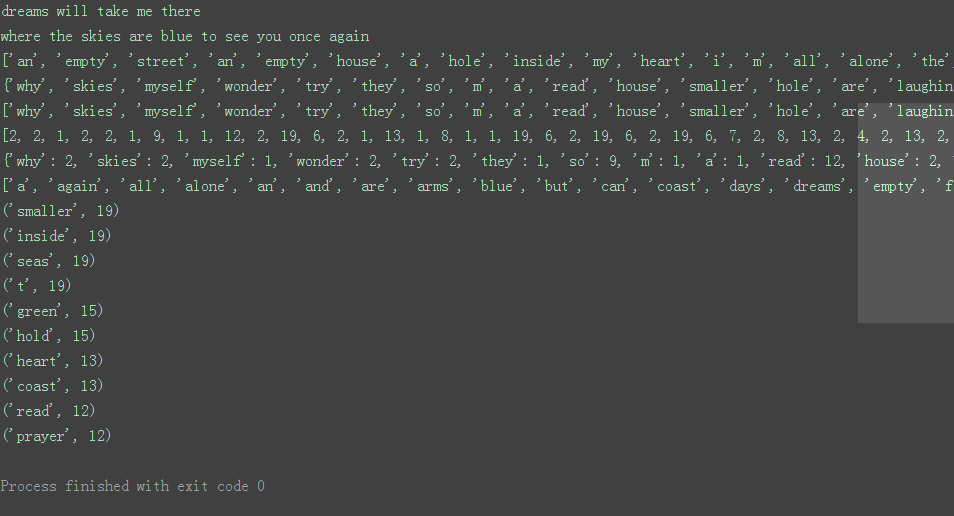- 词频统计预处理
- 下载一首英文的歌词或文章
- 将所有,.?!’:等分隔符全部替换为空格
- 将所有大写转换为小写
- 生成单词列表
- 生成词频统计
- 排序
- 排除语法型词汇,代词、冠词、连词
- 输出词频最大TOP10
# -*- coding: UTF-8 -*-# -*- str='''An empty street An empty house A hole inside my heart I'm all alone The rooms are getting smaller I wonder how I wonder why I wonder where they are The days we had The songs we sang together Oh yeah And oh my love I'm holding on forever Reaching for a love that seems so far So i say a little prayer And hope my dreams will take me there Where the skies are blue to see you once again, my love Over seas and coast to coast To find a place i love the most Where the fields are green to see you once again, my love I try to read I go to work I'm laughing with my friends But i can't stop to keep myself from thinking Oh no I wonder how I wonder why I wonder where they are The days we had The songs we sang together Oh yeah And oh my love I'm holding on forever Reaching for a love that seems so far Mark: To hold you in my arms To promise you my love To tell you from the heart You're all i'm thinking of I'm reaching for a love that seems so far So i say a little prayer And hope my dreams will take me there Where the skies are blue to see you once again, my love Over seas and coast to coast To find a place i love the most Where the fields are green to see you once again,my love say a little prayer dreams will take me there Where the skies are blue to see you once again''' a={",",".","?","!","'",":"}#将所有分隔符全部替换为空格 for i in a: str=str.replace(i," ") print(str) str=str.lower()#将所有大写转换为小写 print(str) str=str.split() ls=list(str) #单词列表 print(ls) set=set(ls) #将列表转为集合,将重复元素去掉 print(set) ls1=list(set) #再把集合转成列表作为无重复列表 print(ls1) ls2=[] #空列表,存放词频 for i in ls: ls2.append(str.count(i)) #统计词频 print(ls2) dict=dict(zip(ls1,ls2)) #将单词列表与对应频数组成字典 print(dict) Dec = sorted(dict.keys()) #排序 print(Dec) #排除语法型词汇,代词、冠词、连词 str1=['a','an','all','the','are','how','my','why','they','where','had','on','that','so','i','for','and','over','there','will'] for i in str1: del dict[i] dict2=sorted(dict.items(), key=lambda x: x[1], reverse=True) #输出词频最大TOP10 for i in range(10): print(dict2[i])
- 截图
-

转载于:https://www.cnblogs.com/ashh/p/8654236.html























 1950
1950

 被折叠的 条评论
为什么被折叠?
被折叠的 条评论
为什么被折叠?








